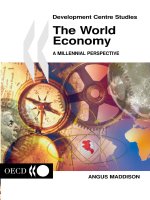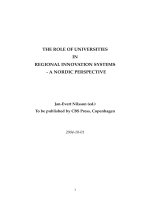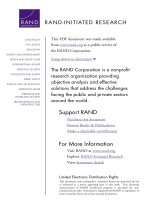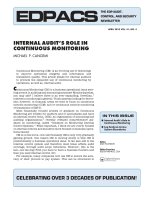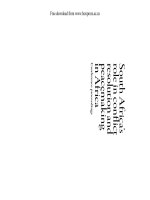Bordo wynne (eds ) the federal reserve’s role in the global economy a historical perspective (2016)
Bạn đang xem bản rút gọn của tài liệu. Xem và tải ngay bản đầy đủ của tài liệu tại đây (22.6 MB, 346 trang )
The Federal Reserve’s Role in the Global Economy
The importance of international considerations in the US Federal Reserve
System’s deliberations has grown over time as global financial crises and
events create ever stronger repercussions in the US economy. This book critically evaluates the role of the Federal Reserve System as a player in the international monetary system over the past 100 years, starting with its initial
responsibility under the gold standard and looking ahead to the challenges it
will face in the twenty-first century under the fiat standard. The book is based
on a conference of the same name held at the Federal Reserve Bank of Dallas
in September 2014, as part of the Federal Reserve System’s centennial, and
contributors include many of the most highly regarded financial historians
and policymakers.
Michael D. Bordo is Board of Governors Professor of Economics at Rutgers
University. He is also a research associate of the NBER and a distinguished
visiting fellow at the Hoover Institution, Stanford University. He has published widely in monetary economics and economic history with 15 books
and over 200 journal articles and chapter contributions.
Mark A. Wynne is a vice president at the Federal Reserve Bank of Dallas,
Associate Director of Research for International Economics, and the founding Director of the Bank’s Globalization and Monetary Policy Institute. In
the latter role, Wynne is responsible for developing and leading the Bank’s
research program on globalization and understanding its implications for the
conduct of US monetary policy.
Studies in Macroeconomic History
Series Editor: Michael D. Bordo, Rutgers University
Editors
Owen F. Humpage, Federal Reserve Bank of Cleveland
Chris Meissner, University of California, Davis
Kris James Mitchener, Santa Clara University
David C. Wheelock, Federal Reserve Bank of St. Louis
The titles in this series investigate themes of interest to economists and economic
historians in the rapidly developing field of macroeconomic history. The four areas
covered include the application of monetary and finance theory, international
economics, and quantitative methods to historical problems; the historical application
of growth and development theory and theories of business fluctuations; the history of
domestic and international monetary, financial, and other macroeconomic institutions;
and the history of international monetary and financial systems. The series amalgamates
the former Cambridge University Press series Studies in Monetary and Financial History
and Studies in Quantitative Economic History.
Other books in the series
Owen Humpage, Editor, Current Federal Reserve Policy Under the Lens of Economic
History, 2015
Michael D. Bordo and William Roberds, Editors, The Origins, History, and Future of the
Federal Reserve, 2013
Michael D. Bordo and Ronald MacDonald, Editors, Credibility and the International
Monetary Regime, 2012
Robert L. Hetzel, The Great Recession, 2012
Tobias Straumann, Fixed Ideas of Money, Small States and Exchange Rate Regimes in
Twentieth-Century Europe, 2010
Forrest Capie, The Bank of England: 1950s to 1979, 2010
Aldo Musacchio, Experiments in Financial Democracy: Corporate Governance and
Financial Development in Brazil, 1882–1950, 2009
Claudio Borio, Gianni Toniolo, and Piet Clement, Editors, The Past and Future of Central
Bank Cooperation, 2008
Robert L. Hetzel, The Monetary Policy of the Federal Reserve: A History, 2008
Caroline Fohlin, Finance Capitalism and Germany’s Rise to Industrial Power, 2007
John H. Wood, A History of Central Banking in Great Britain and the United States, 2005
Gianni Toniolo (with the assistance of Piet Clement), Central Bank Cooperation at the
Bank for International Settlements, 1930–1973, 2005
Richard Burdekin and Pierre Siklos, Editors, Deflation: Current and Historical
Perspectives, 2004
Pierre Siklos, The Changing Face of Central Banking: Evolutionary Trends since World
War II, 2002
(continued after index)
The Federal Reserve’s Role in the
Global Economy
A Historical Perspective
Edited by
MICHAEL D. BORDO
Rutgers University, New Jersey
MARK A. WYNNE
Federal Reserve Bank of Dallas
32 Avenue of the Americas, New York, NY 10013
Cambridge University Press is part of the University of Cambridge.
It furthers the University’s mission by disseminating knowledge in the pursuit
of education, learning, and research at the highest international levels of excellence.
www.cambridge.org
Information on this title: www.cambridge.org/9781107141445
© Federal Reserve Bank of Dallas 2016
This publication is in copyright. Subject to statutory exception
and to the provisions of relevant collective licensing agreements,
no reproduction of any part may take place without the written
permission of Cambridge University Press.
First published 2016
A catalog record for this publication is available from the British Library.
Library of Congress Cataloging in Publication Data
Names: Bordo, Michael D., editor. | Wynne, Mark A., editor.
Title: The Federal Reserve’s role in the global economy : a historical
perspective / edited by Michael D. Bordo, Mark A. Wynne.
Description: New York : Cambridge University Press, 2016. |
Series: Studies in macroeconomic history |
Includes bibliographical references and index.
Identifiers: LCCN 2015043517 | ISBN 9781107141445 (hardback)
Subjects: LCSH: Federal Reserve Banks. | Monetary policy – United States. |
Financial crises – United States. | United States – Economic policy – 2009– |
BISAC: BUSINESS & ECONOMICS / Economics / Macroeconomics.
Classification: LCC HG2563.F463 2016 | DDC 332/.042–dc23
LC record available at />ISBN 978-1-107-14144-5 Hardback
Cambridge University Press has no responsibility for the persistence or accuracy of URLs
for external or third-party Internet Web sites referred to in this publication and does not
guarantee that any content on such Web sites is, or will remain, accurate or appropriate.
Contents
Contributor Biographies
page ix
Acknowledgments
xix
1.Introduction
Michael D. Bordo and Mark A. Wynne
2.
Doctrinal Determinants, Domestic and International, of Federal
Reserve Policy 1914–1933
Barry Eichengreen
Harold James
Navigating Constraints: The Evolution of Federal Reserve
Monetary Policy, 1935–1959
Mark A. Carlson and David C. Wheelock
Comments on Carlson and Wheelock by
Gary Richardson
4.
Federal Reserve Policy and Bretton Woods
Michael D. Bordo and Owen F. Humpage
Comments on Bordo and Humpage by
James M. Boughton
5.
14
46
Comments on Eichengreen by
3.
1
The Federal Reserve Engages the World (1970–2000): An
Insider’s Narrative of the Transition to Managed Floating and
Financial Turbulence
Edwin M. Truman
50
84
89
121
128
191
Comments on Truman by
Michael P. Dooley
vii
Contents
viii
6.
The Federal Reserve in a Globalized World Economy
John B. Taylor
Comments on Taylor by
Richard H. Clarida
7.
Unprecedented Actions: The Federal Reserve’s Response to the
Global Financial Crisis in Historical Perspective
Frederic S. Mishkin and Eugene N. White
Comments on Mishkin and White by
Steven B. Kamin
8.
Panel Discussion on the Federal Reserve’s Role in International
Financial Crises
The Fed’s Role in International Crises by
Donald Kohn
The Fed in International Crises by
Charles Bean
The Global Dollar System by
Stephen G. Cecchetti
Perspectives of the Fed’s Role in International Crises by
Guillermo Ortiz
9.
The Robert V. Roosa Lecture: Excerpts from a Conversation
between Richard W. Fisher and Paul A. Volcker
Index
195
218
220
259
266
274
278
285
292
301
Contributor Biographies
Charles Bean served as deputy governor for monetary policy at the Bank
of England, a position he held from 2008 until June 2014. Prior to that, he
held positions as executive director and chief economist at the Bank. Bean
has served in a variety of other public policy roles, including as a consultant
to HM Treasury; special adviser to both the Treasury Committee of the
House of Commons and to the Economic and Monetary Affairs Committee
of the European Parliament; and as special adviser to the House of Lords
inquiry into the European Central Bank. Other previous posts include roles
in HM Treasury; professor and department chair at the London School of
Economics; and visiting professor at Stanford University. He has published
widely, in both professional journals and more popular media, on monetary policy, European unemployment, and macroeconomics, generally. He
has served on the boards of several academic journals and was managing
editor of the Review of Economic Studies. Bean was named president of the
Royal Economic Society in 2013 and knighted in June 2014. He earned a
BA in economics and mathematics from Emmanuel College, Cambridge,
and a PhD from Massachusetts Institute of Technology.
Michael D. Bordo is Board of Governors Professor of Economics and
director of the Center for Monetary and Financial History at Rutgers
University. He has held previous academic positions at the University of
South Carolina and Carleton University in Ottawa, Canada. Bordo has
been a visiting professor at the University of California, Los Angeles;
Carnegie Mellon University; Princeton University; Harvard University;
and Cambridge University, where he was Pitt Professor of American
History and Institutions. He is currently a distinguished visiting fellow at
the Hoover Institution at Stanford University. Bordo has been a visiting
scholar at the International Monetary Fund; Federal Reserve Banks of St.
ix
x
Contributor Biographies
Louis, Cleveland, and Dallas; Federal Reserve Board of Governors; Bank of
Canada; Bank of England; and the Bank for International Settlements. He
is a research associate of the National Bureau of Economic Research. He is
also a member of the Shadow Open Market Committee. He has published
many articles in leading journals and thirteen books on monetary economics and monetary history. He is editor of a series of books for Cambridge
University Press titled Studies in Macroeconomic History. Bordo has a BA
from McGill University, an MSc from the London School of Economics,
and a PhD from the University of Chicago.
James M. Boughton is a senior fellow at the Center for International
Governance Innovation (CIGI). Prior to joining CIGI, he held a number of
positions at the International Monetary Fund, serving as historian, assistant director in the Strategy, Policy, and Review Department, and in various
positions in the Research Department. He also was a professor of economics at Indiana University and an economist in the Monetary Division at
the Organization for Economic Cooperation and Development in Paris.
Boughton is the author of two volumes of IMF history: Silent Revolution:
The International Monetary Fund 1979–1989 and Tearing Down Walls: The
International Monetary Fund 1990–1999. His other publications include
a textbook on money and banking, a book on the US federal funds market, three books on IMF topics that he coedited, and articles in professional journals on international finance, monetary theory and policy,
international policy coordination, and the history of economic thought.
Boughton earned a BA in economics from Duke University, an MA in economics from the University of Michigan, and a PhD in economics from
Duke University.
Mark A. Carlson is a senior economist in the Division of Monetary Affairs
at the Federal Reserve Board of Governors. In addition to contributing
to staff efforts supporting monetary policy at the Federal Reserve, he has
worked on issues related to financial stability and to developments in the
commercial banking sector. His research focuses on understanding financial crises, particularly historical episodes such as the banking crises of the
1930s and the panics of the National Banking Era, and on understanding the impact of such crises on financial intermediation. Dr. Carlson’s
work has been published in the Journal of Political Economy; the Journal
of Money, Credit and Banking; the Berkeley Economic Journal of Economic
Analysis and Policy; and Explorations in Economic History. He received his
PhD from the University of California, Berkeley.
Contributor Biographies
xi
Stephen G. Cecchetti is academic dean and a professor of international
economics at Brandeis International Business School. Prior to rejoining Brandeis in January 2014, he completed a five-year term as economic
adviser and head of the Monetary and Economic Department at the Bank
for International Settlements in Basel, Switzerland. While there, Cecchetti
participated in numerous postcrisis global regulatory reform initiatives, including involvement with both the Basel Committee on Banking
Supervision and the Financial Stability Board in establishing new international standards. Cecchetti’s academic appointments include serving on the
faculties of the Stern School of Business at New York University and the
Department of Economics at the Ohio State University. He has also served
as executive vice president and director of research at the Federal Reserve
Bank of New York; editor of Journal of Money, Credit and Banking; research
associate at the National Bureau of Economic Research; and as research fellow at the Center for Economic Policy Research. Cecchetti received a PhD
in economics from the University of California, Berkeley.
Richard H. Clarida is the C. Lowell Harriss Professor of Economics and
International Affairs at Columbia University, where he has taught since
1988. From February 2002 until May 2003, he served as assistant secretary
of the Treasury for economic policy, working as chief economic adviser to
the Treasury secretary. Other positions have included chairman of the economics department at Columbia University, professor at Yale University,
and senior staff economist with the Reagan administration’s Council of
Economic Advisers. Clarida’s work on monetary policy, exchange rates,
interest rates, and international capital flows has appeared in academic
journals. He has been a global strategic adviser with PIMCO since 2006.
Clarida is a member of the Council on Foreign Relations and the National
Bureau of Economic Research. With NBER, he has served as director of the
project on and editor of G7 Current Account Imbalances: Sustainability and
Adjustment (University of Chicago Press, 2007). Since 2004, he has served
as coeditor of the NBER International Macroeconomics Annual and since
2009 as co-managing editor of the Journal of Applied Financial Economics.
Clarida received his BS from the University of Illinois and his MA and PhD
from Harvard University.
Michael P. Dooley has served as professor of economics at the University
of California, Santa Cruz since 1992, after holding positions at the Board of
Governors of the Federal Reserve System and in the Research Department
of the International Monetary Fund. He is a partner at Cabezon Investment
xii
Contributor Biographies
Group and Drobny Global Advisors. His research includes issues in openeconomy macroeconomics, including Bretton Woods II, crises in emerging
markets, debt management, capital controls, capital flight, and liberalization of financial markets. Dooley is also a research associate at the National
Bureau of Economic Research and an international research fellow with the
Kiel Institute for the World Economy. He is an editor with the International
Journal of Finance and Economics. Dooley earned a BS in economics from
Duquesne University, an MA in economics from the University of Delaware,
and a PhD in economics from Pennsylvania State University.
Barry Eichengreen is the George C. Pardee and Helen N. Pardee Professor
of Economics and Professor of Political Science at the University of
California, Berkeley, where he has taught since 1987. He is also a research
associate of the National Bureau of Economic Research, research fellow of
the Center for Economic Policy Research, and a fellow of the American
Academy of Arts and Sciences. Eichengreen is the convener of the Bellagio
Group of academics and economic officials and chair of the Peterson
Institute of International Economics’ academic advisory committee. He has
served as senior policy adviser at the International Monetary Fund, has held
Guggenheim and Fulbright fellowships, and has been a fellow of the Center
for Advanced Study in the Behavioral Sciences at Stanford University and of
the Institute for Advanced Study in Berlin. Eichengreen’s recent books are
From Miracle to Maturity: The Growth of the Korean Economy, with Dwight
H. Perkins and Kwanho Shin, and Exorbitant Privilege: The Rise and Fall of
the Dollar and the Future of the International Monetary System. He is also a
regular monthly columnist for Project Syndicate. Eichengreen earned a PhD
in economics from Yale University.
Richard W. Fisher was president and CEO of the Federal Reserve Bank of
Dallas from 2005 to 2015. Fisher served as a member of the Federal Open
Market Committee, the Federal Reserve’s principal monetary policymaking
group. He is a former vice chairman of Kissinger McLarty Associates and
was founder of Fisher Capital Management and Fisher Ewing Partners.
He served as assistant to the secretary of the Treasury during the Carter
administration. As deputy US trade representative from 1997 to 2001,
Fisher oversaw the implementation of NAFTA and various agreements
with Vietnam, Korea, Japan, Chile, and Singapore. He was a senior member of the team that negotiated the bilateral accords for China and Taiwan’s
accession to the World Trade Organization. Throughout his career, Fisher
has served on numerous for-profit and not-for-profit boards, taught graduate courses, and served on several university boards. He also serves on
Contributor Biographies
xiii
Harvard University’s Board of Overseers, one of the university’s two governing boards. Fisher was a Weatherhead Fellow at Harvard in 2001, is an
honorary fellow of Hertford College at Oxford University, and is a fellow of
the American Academy of Arts and Sciences. He is a recipient of the Service
to Democracy Award and Dwight D. Eisenhower Medal for Public Service
from the American Assembly and a Dallas Business Hall of Fame inductee.
Fisher attended the US Naval Academy, earned a degree in economics from
Harvard University, read Latin American politics at Oxford, and received
an MBA from Stanford University.
Owen F. Humpage is a senior economic advisor specializing in international economics in the Research Department of the Federal Reserve Bank
of Cleveland. His research focuses on the international aspects of centralbank policies and has appeared in the International Journal of Central
Banking, the International Journal of Finance and Economics, and the
Journal of Money, Credit and Banking. Humpage has taught at Case Western
Reserve University, Oberlin College, Cleveland State University, and
Baldwin-Wallace College. He holds a BA in economics from the University
of Dayton, an MA in economics from Miami University, and a PhD in economics from Case Western Reserve University.
Harold James, who studies economic and financial history and modern German history, is the Claude and Lore Kelly Professor in European
Studies, a professor of history and international affairs, and director of
the Contemporary European Politics and Society program at Princeton
University. He is also a Marie Curie Visiting Professor at the European
University Institute. Before joining Princeton in 1986, he was a fellow of
Peterhouse at Cambridge University for eight years. James has authored
a number of books, including International Monetary Cooperation since
Bretton Woods, The End of Globalization, and Making the European
Monetary Union. He is a past recipient of the Helmut Schmidt Prize in
German–American Economic History and the Ludwig Erhard Prize for
writing about economics. As coauthor of The Deutsche Bank, 1870–1995,
he won the Financial Times Global Business Book Award in 1996. James
holds a PhD from Cambridge University.
Steven B. Kamin is director of the International Finance Division at the
Board of Governors of the Federal Reserve System. His fields of interest are
open-economy macroeconomics and international finance. Kamin has held
a number of positions at the Board, including serving as chief of the international development section and as senior economist. He has also worked
xiv
Contributor Biographies
as a visiting economist at the Bank for International Settlements, senior
economist with the Council of Economic Advisers, and as research consultant at the World Bank. Kamin’s most recent work has been published in the
Journal of International Economics, Journal of Money, Credit and Banking,
and Journal of International Money and Finance. Kamin earned a BA in economics and history from the University of California, Berkeley and a PhD
in economics from the Massachusetts Institute of Technology.
Donald Kohn is Robert S. Kerr Senior Fellow in the Economic Studies
Program at the Brookings Institution. He is also a member of the Financial
Policy Committee at the Bank of England. A former vice chairman of the
Federal Reserve, he is an expert on monetary policy, financial regulation,
and macroeconomics. He advised former Federal Reserve Chairman Ben
Bernanke throughout the 2008–09 financial crisis and was a key adviser to
former Fed Chairman Alan Greenspan. Kohn is a forty-year veteran of the
Federal Reserve System. He has served as an adviser to the Board for monetary policy, secretary of the Federal Open Market Committee, director of
the Division of Monetary Affairs, and in a number of other staff positions at
the Board of Governors. He was appointed to the Board in 2002 and as vice
chair in 2006. He also served as chairman of the Committee on the Global
Financial System, a central bank panel that monitors and examines broad
issues related to financial markets and systems. Kohn has written extensively on issues related to monetary policy and financial stability. He holds
a PhD in economics from the University of Michigan.
Frederic S. Mishkin is the Alfred Lerner Professor of Banking and Financial
Institutions at the Graduate School of Business at Columbia University and
a research associate at the National Bureau of Economic Research. His
research focuses on monetary policy and its impact on financial markets
and the aggregate economy. Mishkin is a former member of the Board
of Governors of the Federal Reserve System, and he previously served as
senior fellow at the FDIC Center for Banking Research, president of the
Eastern Economic Association, executive vice president and director of
research at the Federal Reserve Bank of New York, and associate economist of the Federal Open Market Committee. Mishkin has taught at the
University of Chicago, Northwestern University, Princeton University, and
Columbia. He has authored more than 20 books, including The Economics
of Money, Banking and Financial Markets, and Financial Markets and
Institutions, and he has published over 200 articles in professional journals and books. Mishkin has served as editor and on the editorial board
for numerous academic journals. He has been a consultant to the Federal
Contributor Biographies
xv
Reserve Board, the World Bank, the Inter-American Development Bank,
and the International Monetary Fund, as well as to central banks throughout the world. He was also a member of the International Advisory Board
to the Financial Supervisory Service of South Korea and an adviser to
the Institute for Monetary and Economic Research at the Bank of Korea.
Mishkin received his PhD in economics from the Massachusetts Institute
of Technology.
Guillermo Ortiz is chairman of Grupo Financiero Banorte–IXE. He was
governor of the Banco de México from 1998 to 2009. He served as secretary of Mexico’s Finance Ministry from 1994 to 1997 and undersecretary
from 1988 to 1994. He is a member of the Group of Thirty. He chairs the
Per Jacobsson Foundation and is on the board of the Center for Financial
Stability, the advisory council of the SWIFT Institute, and the advisory
board of the Globalization and Monetary Policy Institute at the Federal
Reserve Bank of Dallas. Ortiz is also director and member of other international organizations and serves on the board of several companies. His
previous posts include executive director at the International Monetary
Fund and manager in the Economic Research Department of the Banco de
México. He served as chairman of the board of the Bank for International
Settlements, where he also chaired the Central Bank Governance Forum.
Ortiz also was a member of the Committee to Study Sustainable Long-Term
Financing of the IMF and on the Committee on IMF Governance Reform.
While at the IMF, he chaired the External Panel for the Review of the Fund’s
Risk Management Framework. Ortiz has taught at universities in Mexico
and the United States. He has written and published two books and numerous papers on economics and finance in specialized journals in Mexico and
abroad and has received several honors and awards. He graduated from the
National Autonomous University of Mexico (UNAM) and earned master’s
and doctoral degrees in economics from Stanford University.
Gary Richardson joined the Federal Reserve System as historian in 2012.
The position was established in connection with the centennial of the
Federal Reserve, which marked its hundredth anniversary in December
2013. As the Fed’s historian, Richardson collaborates with experts at the
Federal Reserve and other organizations to identify, preserve, and make
accessible the Fed’s historical materials. At the time of his appointment
at the Fed, Richardson was an economics professor at the University of
California, Irvine and served as a faculty research associate at the National
Bureau of Economic Research. He has lectured and written numerous articles on banking, monetary policy, and the Fed. Richardson conducts his
xvi
Contributor Biographies
work as the Fed’s historian as a member of the Federal Reserve Bank of
Richmond’s Research Department. Richardson earned a BA in political science from the University of Chicago and a PhD in economics from the
University of California, Berkeley.
John B. Taylor is the Mary and Robert Raymond Professor of Economics at
Stanford University and the director of the Introductory Economics Center.
He is also the George P. Shultz Senior Fellow in Economics at the Hoover
Institution and a senior fellow of the Stanford Institute for Economic Policy
Research. Taylor’s academic fields of expertise are macroeconomics, monetary economics, and international economics. His research on the foundations of modern monetary theory and policy has been applied by central
banks and financial market analysts around the world. He has been on
the President’s Council of Economic Advisers, the Congressional Budget
Office’s Panel of Economic Advisers, and the California Governor’s Council
of Economic Advisors. Taylor served as Undersecretary of Treasury for
International Affairs from 2001 to 2005. He is the author of Global Financial
Warriors: The Untold Story of International Finance in the Post-9/11 World;
Getting Off Track: How Government Actions and Interventions Caused,
Prolonged and Worsened the Financial Crisis; and First Principles: Five Keys
to Restoring America’s Prosperity, for which he was awarded the Hayek
Prize. Among other awards, he received the Treasury Distinguished Service
Award and the Medal of the Republic of Uruguay. Taylor is a Guggenheim
Fellow and a fellow of the American Academy of Arts and Sciences and
the Econometric Society. He formerly served as professor of economics at
Princeton University and Columbia University. Taylor received a BA in economics from Princeton and a PhD in economics from Stanford.
Edwin M. Truman, joined the Peterson Institute for International
Economics as a senior fellow in 2001, and has been a nonresident senior
fellow since 2013. Previously he served as Assistant Secretary of the US
Treasury for International Affairs from December 1998 to January 2001 and
returned as counselor to the secretary in 2009. He also served as director
of the Division of International Finance of the Board of Governors of the
Federal Reserve System and was one of three economists on the staff of the
Federal Open Market Committee. Truman has been a member of numerous
international groups working on economic and financial issues. He has also
been a visiting economics lecturer at Amherst College and a visiting economics professor at Williams College. He has published on international
monetary economics, international debt problems, economic development,
and European economic integration. He is the author, coauthor or editor of
Contributor Biographies
xvii
Sovereign Wealth Funds: Threat or Salvation? (2010), Reforming the IMF for
the 21st Century (2006), A Strategy for IMF Reform (2006), Chasing Dirty
Money: The Fight Against Money Laundering (2004), and Inflation Targeting
in the World Economy (2003). Truman has a BA from Amherst College and
a PhD in economics from Yale University.
Paul A. Volcker launched the Volcker Alliance in 2013 to address the
challenge of effective execution of public policies and to help rebuild
trust in government. Volcker worked in the US federal government for
almost thirty years, culminating in two terms as chairman of the Board of
Governors of the Federal Reserve System from 1979 to 1987. For ten years,
he served as chairman of Wolfensohn & Co., as well as professor emeritus of International Economic Policy at Princeton University. From 1996
to 1999, he was chairman of a committee to determine existing dormant
accounts and other assets in Swiss banks of victims of Nazi persecution.
From 2000 to 2005, he served as chairman of the board of trustees of the
International Accounting Standards Committee. In April 2004, he was
asked by UN Secretary-General Kofi Annan to chair an inquiry into the
United Nations’ Oil-for-Food Program. In 2007, he was asked by the president of the World Bank to chair a panel of experts to review the operations
of the bank’s Department of Institutional Integrity. From November 2008 to
2011, he served as chairman of the President’s Economic Recovery Advisory
Board. Volcker was educated at Princeton, Harvard, and the London School
of Economics.
David C. Wheelock, who joined the Federal Reserve Bank of St. Louis in
1993, is vice president and deputy director of the Research Division. He
serves as an adviser to the Bank president on monetary policy and conducts policy-related economic research. Before joining the St. Louis Fed,
Wheelock was a faculty member of the Department of Economics at the
University of Texas at Austin. He has written numerous articles on banking
and monetary policy topics for professional journals and Federal Reserve
publications. Wheelock is the author of The Strategy and Consistency of
Federal Reserve Monetary Policy, 1924–1933. Wheelock received a BS from
Iowa State University and an MS and PhD from the University of Illinois at
Urbana-Champaign.
Eugene N. White is Distinguished Professor of Economics at Rutgers
University and a research associate of the National Bureau of Economic
Research. He has written extensively on stock market and real estate booms
and crashes, conflicts of interest, deposit insurance, banking supervision,
xviii
Contributor Biographies
the microstructure of securities markets, and war finance. He testified
before the Congressional Oversight Panel for the Troubled Asset Relief
Program and served on the Federal Reserve’s Centennial Advisory Council.
He is currently at work on studies of the evolution of bank supervision in
the United States and of central banking in Europe. On sabbatical this year,
he is a visiting scholar at the Banque de France and a visiting professor at
the École des Hautes Études en Sciences Sociales in Paris. White earned
an AB in history from Harvard University, a BA in history and economics from Oxford University, and an MA and PhD in economics from the
University of Illinois Urbana–Champaign.
Mark A. Wynne is a vice president, associate director of research, and
director of the Globalization and Monetary Policy Institute at the Federal
Reserve Bank of Dallas. He is responsible for developing and leading the
Bank’s research program on globalization and understanding its implications for the conduct of US monetary policy. Since joining the Dallas Fed
in 1989, Wynne has had a variety of responsibilities, including briefing the
Bank’s president on national and international economic conditions prior to
meetings of the Federal Open Market Committee, providing updates on key
economic issues to the Bank’s board of directors, and conducting research
on such topics as the effects of fiscal policy, understanding business cycles,
inflation measurement, and the workings of monetary unions. His research
has appeared in academic journals and in Federal Reserve publications. He
holds a BA and MA from the National University of Ireland–University
College, Dublin, and an MA and PhD in economics from the University of
Rochester.
newgenprepdf
Acknowledgments
The chapters in this book were prepared for a conference on “The Federal
Reserve’s Role in the Global Economy: A Historical Perspective” that was
hosted by the Federal Reserve Bank of Dallas on September 18–19, 2014,
as part of the Federal Reserve System’s centennial observances. We would
like to thank Richard Fisher, former president and chief executive officer of
the Federal Reserve Bank of Dallas, and Harvey Rosenblum, former executive vice president and director of Research at the Federal Reserve Bank
of Dallas, for their support for the conference. We would also like to thank
Kay Gribbin, Laurel Brewster, Jenae Golden, and Magda Salazar for logistical support during the conference, and especially Valerie Grossman for her
outstanding assistance with the preparation of this book.
xix
1
Introduction
Michael D. Bordo and Mark A. Wynne
This book critically evaluates the role of the Federal Reserve System as a
player in the international monetary system over the past 100 years, starting
with its initial responsibility under the gold standard and looking forward
to the challenges it will face under the twenty-first century fiat standard.
The book is based on a conference of the same name held at the Federal
Reserve Bank of Dallas on September 18–19, 2014, as part of the Federal
Reserve System’s centennial observances.
The Federal Reserve Act was signed into law by President Woodrow
Wilson on December 23, 1913. The cities that would host the twelve individual reserve banks were announced on April 2, 1914, and then the banks
opened for business on November 16, 1914. In this chapter, we will highlight some of the salient themes addressed by the contributors to this book
and how these themes have repeated over the years. The Fed both influences
and is influenced by the global economy, but the strength of that influence
has varied over the past century. We can usefully divide the Fed’s history
into four distinct eras. (1) From 1914 to the mid-1930s, Federal Reserve
policy was dictated by the rules of the gold standard, and the Fed occasionally took actions to support foreign central banks. (2) During the Great
Depression, all countries eventually abandoned the gold standard, but gold
inflows from Europe during the latter half of the 1930s complicated life for
Fed policymakers. With the outbreak of war, monetary policy became subservient to fiscal policy. (3) The Fed-Treasury Accord of 1951 ushered in the
modern era of an independent Fed, and during the following two decades
monetary policy was conducted in the context of the Bretton Woods system. That system collapsed in 1971 and was followed by decades of turmoil.
(4) But by 2014, the Fed had become the closest thing the world has to a
global central bank. In the absence of a major reversal of the trend in recent
1
2
Michael D. Bordo and Mark A. Wynne
decades toward greater globalization, the importance of international factors will likely only grow over time.
The Federal Reserve Act was signed in 1913, the peak year for the age
of globalization that existed prior to World War I. From about 1870 to
1914, the global economy was integrated to an extent that was not to be
seen again until the latter decades of the twentieth century. The center of
the global financial system was of course London, and some believed that
the absence of a US central bank had a detrimental effect on the competitiveness of US exports. In particular, the German-American banker Paul
Warburg, who was a leading architect of the Federal Reserve System (Bordo
and Wheelock, 2013), argued that an American central bank could help
develop a market in international trade acceptances and promote the international use of the US dollar (Broz, 1997). This view was also shared by
Benjamin Strong, who was the first governor of the Federal Reserve Bank of
New York. Underpinning this first era of globalization was the classical gold
standard, under which the currencies of the world’s major economies were
fully convertible into gold. The rule-like gold standard regime was associated with a high degree of price stability and exchange rate stability. The
United States had resumed convertibility after the Civil War in 1879 and the
Gold Standard Act of 1900 cemented the gold-based nature of the US monetary system. The Federal Reserve Act required that member banks pay in
their capital in gold or gold certificates. The reserve banks were required
to maintain gold reserves equal to at least 40 percent of their outstanding
notes and 35 percent of their outstanding deposits. Maintenance of adequate gold coverage was thus a pivotal consideration in the Fed’s policy
during the first two decades of its existence. Capital inflows and outflows
(or “external drains”) were of particular importance for districts such as
New York that were more intimately linked to the international economy
than, say, districts such as Dallas.
When the Federal Reserve System opened for business in 1914, gold convertibility had been suspended by most countries for what was expected
at the time to be a relatively brief conflict between the major European
powers. After the cessation of hostilities in 1918, restoration of something
resembling the prewar international monetary order was a major priority
for the world’s leading central bankers. The actions of the Federal Reserve
Bank of New York – which played an outsized role in the System at that
time – were not infrequently influenced by a desire to ease Britain’s transition back onto gold. As of 1924, sterling was still trading at a discount relative to its 1914 parity: the Bank of England simply lacked the gold reserves
to restore the prewar parity. Under the leadership of the New York Fed,
Introduction
3
the reserve banks reduced discount rates from 4.5 percent in early 1923
to a range of 3–4 p
ercent by the middle of 1924. The predecessor of the
Federal Open Market Committee (FOMC) – the Open Market Investment
Committee – authorized the New York Fed to purchase $300 million in US
Treasuries to push down yields in the United States and encourage gold
flows to the United Kingdom. The New York Fed also extended a $200 million line of credit to the Bank of England in exchange for an equivalent
amount of sterling. The United Kingdom returned to gold in 1925 but
had a difficult time maintaining convertibility. In 1927, Benjamin Strong
orchestrated a reduction in the discount rate again to encourage gold flows
toward London. But only eight reserve banks did so voluntarily. For the
first time in the history of the System, the Board imposed the rate cut on
the dissenting banks.
The United States remained on the gold standard until the onset of the
Great Depression, when the Roosevelt administration suspended convertibility in 1933 and then devalued the dollar by 40 percent against gold in
1934 as part of its efforts to end the Depression. The Gold Reserve Act of
1934 authorized the Treasury to intervene in gold and foreign exchange
markets, and created the Exchange Stabilization Fund, which was capitalized using gold transferred from the Fed to the Treasury. The Roosevelt
administration also reorganized the structure of the Federal Reserve System
with the Banking Act of 1935, effectively shifting the locus of power from
New York to Washington. Both Acts reduced the Fed’s autonomy, especially
as regards international monetary arrangements and policy. International
concerns took something of a back seat for the duration of the 1930s and
1940s, although during the latter half of the 1930s the scale of gold inflows
from Europe left the Fed with less scope to use open market operations to
respond to macroeconomic conditions. For the duration of World War II
and for several years thereafter, the primary concern of the Fed was to support the Treasury in financing the war effort and managing the legacy of
debt that was accumulated over the course of that conflict. By the later 1940s
and early 1950s, tensions were beginning to set in between the need for the
Fed to promote full employment and price stability, while at the same time
pegging long-term interest rates. The result was the famous Fed-Treasury
Accord of 1951 that marks the beginning of the modern era of a Federal
Reserve that is independent within the structure of government.
The subsequent decade of the 1950s was something of a golden era for
Federal Reserve policymakers. Freed of the constraints to peg long-term
interest rates and with international considerations playing a minor
role in policy deliberations, the FOMC focused primarily on domestic
